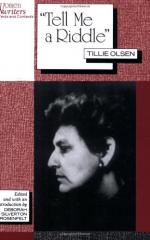|
This section contains 185 words (approx. 1 page at 300 words per page) |
Tillie Olsen has given voice to constituencies that have traditionally been unrepresented in literature, particularly working-class women. Influenced by her socialist parents, Olsen joined the Young Communist League in 1931 and embarked on a career of political activism. Her first short story, "The Iron Throat" (1934), was published in Partisan Review and reappeared as the first chapter to Yonnondio, an uncompleted novel manuscript that she rediscovered in 1973. As this lapse indicates, Olsen's artistic career was interrupted, primarily by the exigencies of motherhood and poverty. She poignantly reflected on the gender politics of her forced sabbatical in Silences (1978). A fellowship to Stanford University enabled her to resume writing in 1957, when she began a collection of short fiction, Tell Me a Riddle (1961). The title piece earned the O. Henry Award for the year's outstanding short story. In addition to writing, Olsen has played a prominent role in recovering previously unheralded women authors, including Rebecca Harding Davis, Charlotte Perkins Gilman, and Agnes Smedley.
Further Reading:
Coiner, Constance. Better Red: The Writing and Resistance of Tillie Olsen and Meridel LeSeuer. New York, Oxford University Press, 1995.
|
This section contains 185 words (approx. 1 page at 300 words per page) |


